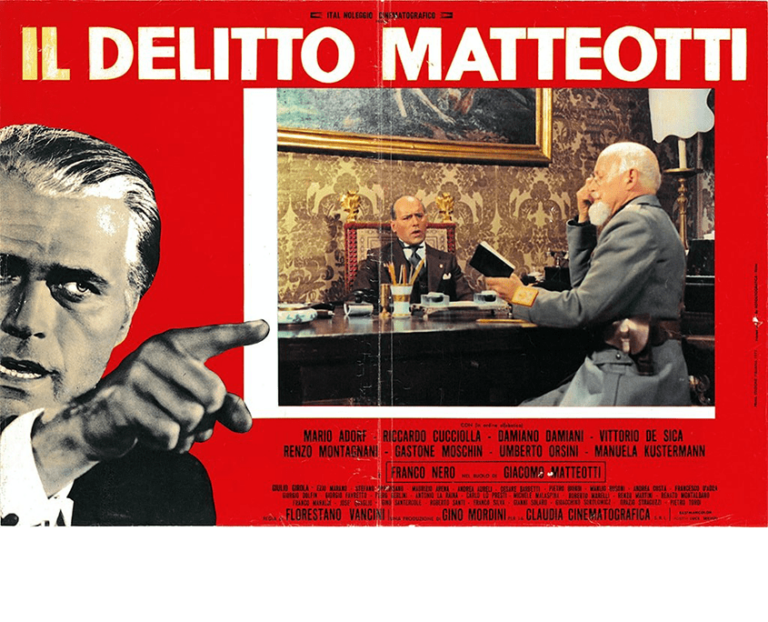- Sun 3 March 2024
The DELITTO MATTEOTTI in Lezioni di Cinema
It ends on Sunday, March 3rd at the Artistic Center Il Grattacielo, via del Platano, 6, with the screening of the film “The Matteotti Murder”, the seventh edition of Cinema Lessons “The history, the stories”.
Introduced by Massimo Ghirlanda, president of the Center for Italian Comedy Studies. Admission ticket 6 euros.
Lessons of Cinema is organized in synergy between 50 & Più University of Livorno, Centro Studi Commedia all’italiana, Erasmo Libri Editore, and the Circolo del Cinema Kinoglaz, which for years have been promoting the culture of Cinema in the local area.
The crime Matteotti (Italy, 1973, duration 120 min.) is a 1973 film directed by Florestano Vancini, based on the real events of the Matteotti crime and its consequences. With Franco Nero (Giacomo Matteotti), Mario Adorf, Umberto Orsini, Vittorio De Sica, Gastone Moschin, Riccardo Cucciolla, Manuela Kustermann.
In Rome, on May 30, 1924, the honorable Giacomo Matteotti, secretary of the United Socialist Party, in a courageous and engaging speech, asks that the elections of April 6 be annulled, questioning their validity. The politician argues that the government majority list was only nominally supported by over 4 million votes, but did not receive the actual and free votes: voters, due to illegalities, retaliations, and violence suffered, gave their consent to the National Fascist Party.
These words immediately provoke reactions in the press and public opinion, and even within the government, there is fear of popular uprisings. Nothing prevents the mysterious kidnapping of the deputy on June 10. Public opinion is shocked, political opposition coalesces and decides to boycott the Parliament’s work. It is difficult to start investigations to find Matteotti, but media and public pressure force Benito Mussolini (Mario Adorf) to make decisions. A speech will be given at the Chamber by the future Duce on January 3, 1925: it will be the real beginning of the dictatorship…
Florestano Vancini – Director and screenwriter. He approached cinema with a series of short films in the early ’50s, after working as an assistant director and screenwriter for “La donna del fiume” (1954) by Mario Soldati and as an assistant director for Zurlini for “Estate violenta” (1959). The following year he made his debut in feature films with “La lunga notte del ’43”, an adaptation of Cinque storie ferraresi by Giorgio Bassani, immediately showing the essence of his cinema. A politics enthusiast, the director from Ferrara supports a cinema “committed” in which various episodes of Italian history are told in subsequent films, such as “La banda Casaroli” (1961), “Bronte: storia di un massacro…” (1971), “Il delitto Matteotti” (1973). He also appeared as an actor in “Cadaveri eccellenti” (1976) by Francesco Rosi. In the ’80s, Vancini made television fictions such as “La neve nel bicchiere” (1984), “La piovra II” (1986), and “Piazza di Spagna” (1991), as well as some episodes of the series “Il giudice istruttore”. In 2005, he managed to make the feature film “E ridendo l’uccise,” a historical film narrating how injustices and cruelty were common even in the Renaissance, which remains his last work.
Massimo Ghirlanda is a teacher and one of the founders of the Centro Studi Commedia all’Italiana di Castiglioncello, of which he has been president since 2009. He taught History of Cinema courses and was interested in Italian cinema authors. In 2007, for the publisher Pacini, he published the volume Castiglioncello e il cinema. I film, i luoghi e i personaggi. He is the director of the series I Quaderni di Storia del cinema of the publishing house Erasmo, of which he has curated critical editions of the screenplays of Il Sorpasso by Scola and Maccari and In nome del popolo italiano by Age and Scarpelli. Since 2012, he has been part of the jury of the Suso Cecchi D’Amico Award for the best screenplay.
INFO: 50 & Più Association Livorno Via Serristori 15
Coordination: Prof. Gianfranco Panariello (50 & Più University Livorno); Artistic direction: Prof. Massimo Ghirlanda (Centro Studi Commedia all’Italiana); Press Office: Maurizio Mini.


Subscribe to the newsletter to stay updated
Don't miss any news about events in Livorno and surroundings.


